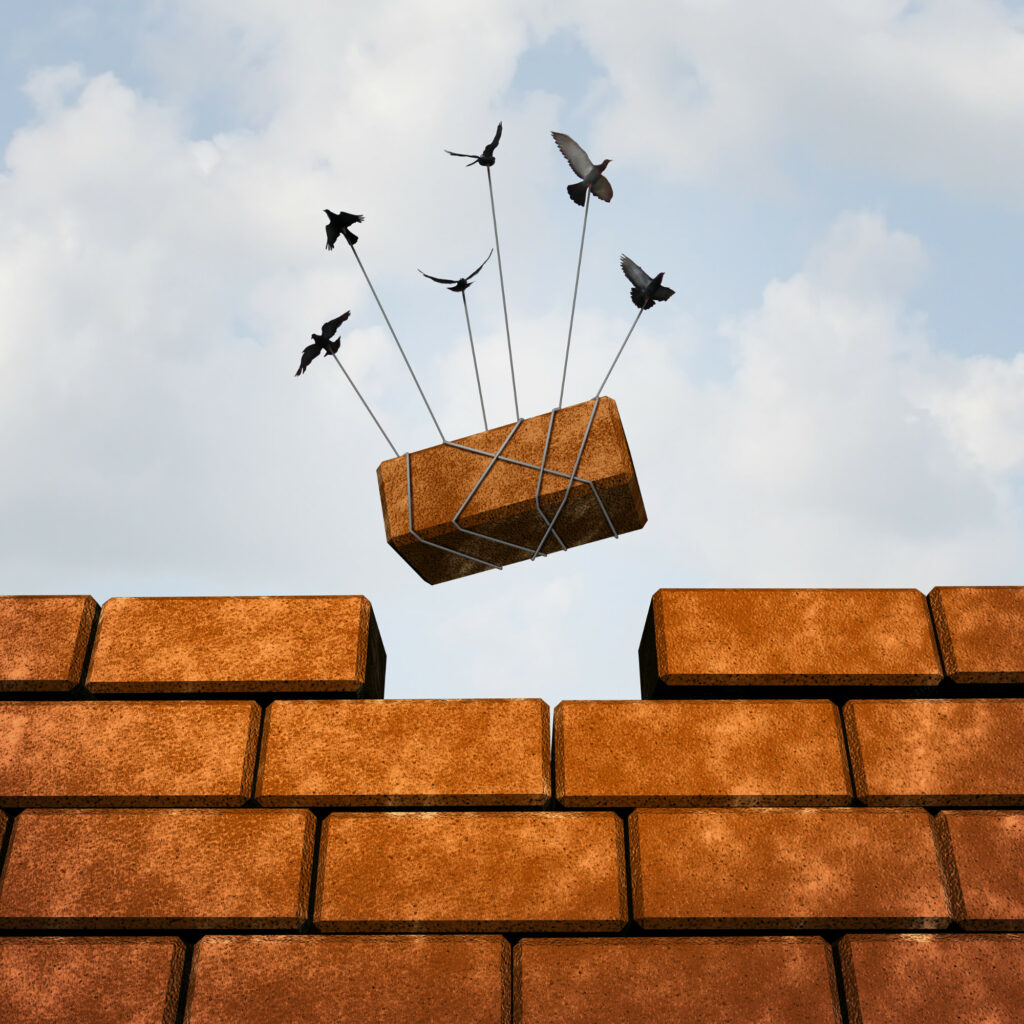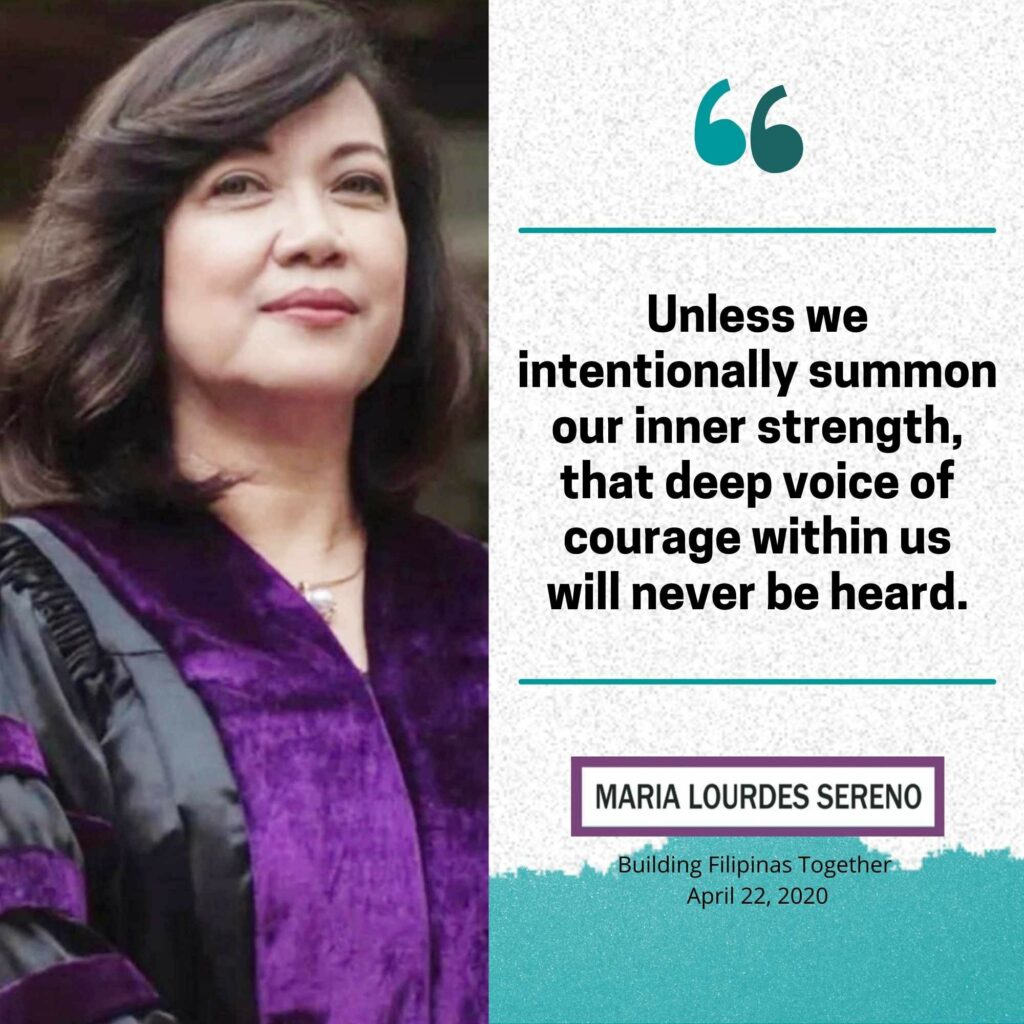BUILDING FILIPINAS TOGETHER
By Maria Lourdes Sereno

Dear Friends,
As I look at what the COVID-19 virus has done to us as a people, my heart longs for the filling of the vacuum that had been left with my father’s passing 17 years ago.
My father was born and raised in Siasi, Sulu. Brilliant, articulate, handsome, he dreamt of a life in Manila where he would raise his children to have a good education. True enough, he got to Manila, married an equally intelligent Tagala teacher from Laguna, and thought that he could make a name for himself in whatever circle of influence he could generate with his talent, his charm, his engaging personality, and his looks.
Part of the stories that made up my dream-filled childhood were his tales of Simunul, Bongao, Tawi-Tawi, Jolo, and of course, Siasi. He would talk of Siasi as paradise. His favorite stories were of mischievous forays into the jungle where he would spot the ripening durian fruit, hook it down, hide it beneath banana leaves and sneak out, acting as if he had just buried the biggest treasure of all. And when–he knew just when–the durian would be just right, he would retrieve it, a conquering hero, to fill himself with his golden booty. So, I have always looked at durian as the apex prize for great conquests and stout hearts–the very stuff of childhood dreams. When my father finally brought durian to our small apartment in Quezon City, I dug into the fruit with all gusto, filling myself with the warm memory of my father’s childhood story. Of course, my mother’s Tagala nose would be in an “ismid” –hahaha! She couldn’t bear the heavenly smell of the fruit.
Turtle eggs, wild boar meat, mangosteen, rambutan, marang–these were strange fare to my poor neighborhood playmates, but to me they were magical food, and boy, did I feel like a big, big person because I ate them.
I have always dreamt of reconciling my father’s dreams with his roots. How he longed for his people to step out of the margins where the cosmopolitans of the country had consigned them into a place of obsolete legend. When I remember my father, I know that, somehow, he thought that Sulu could have been a bigger place than the customs and army people made it: a source of blue seal cigarettes, arms, batik and insurgent armies.
I knew that Father Bill, the American priest who trained him as a sacristan, had taught him well because my father spoke almost as articulately as a white man. But I also knew that in him lay the famous temper of his Southern side, and that the tension of having been an orphan raised by a Muslim uncle and a Catholic aunt left him with many unresolved questions in the big city of Manila.
I wondered why my father could not find that livelihood stability that his talent should have merited him. He always seemed partly in–and when in, he was very much the leader: headstrong, a champion, always first in many things, always the President or officer of this and that organization. But when the system cut him, he would find himself cruelly out of place. He would slip into despondency, and those were the times that I found darkest.
Looking back, my father’s contradictions, his being so very “in” one day and so out of place the next, is not strange for many kababayans. I think all of us, especially those of us with strong provincial roots, have always longed for the affirmation that we are really “in” this big project called “Filipinas.”
Fast forward to today.
We are going through a horrible awakening. It does not matter what your background is, or what your politics have made you. It does not matter if you live in a hovel and earn only a daily wage or live on a pakyaw-labada basis. It does not even matter even if you have a US, Canadian, or EU visa, it can get you. Silent, insidious killers such as the newly-emerged COVID-19 are both a reality and a symbol. It is the reality that slaps our governments out of their stupor and knocks our pretensions at learning and civility clear out of the picture. It also symbolizes that question that has always demanded an answer, one that millennia of human existence have insisted we face, or else, the all-important question of meaning.
Back to my father. After decades of struggle, my father found that the only real hope he had was in Jesus and His offer of a fresh start, of a never-ending companionship, of cleansing for all his youthful and not-youthful transgressions, and of a guilt-free old age. How very real Jesus was to my father. He surrendered his life to Christ when he was past 60, and it took more than a decade of walking with Jesus for him to enjoy that sweetness of spirit that our great God grants even to the over-confident. To our children and his other grandchildren, Lolo was a living hero, the sweetest Lolo anyone could have ever had, their champion. I think they’re perfectly accurate; they met their Lolo at his prime, when in his old age his heart was already captive to Jesus.
Jesus was very real to my father. As he battled lung cancer, undergoing eight operations that punctured openings for the pleural effusions from his drowning lungs to flow out and cut out pericardial difficulties, how very real Jesus was to him. He didn’t need painkillers, he said so himself. He was diabetic and of course that complicated the treatment for his fourth stage lung cancer. I was privileged to be by his side most of that time. While I was lawyering for the country’s biggest international case then, I was furiously researching all kinds of options, including homeopathic ones, to help my father survive. He never complained, not even once, even when I thought he might be in great pain. His constant byword was: “Thank you, Jesus.” When he could breathe, “thank you, Jesus.” When he could not breathe, “thank you, Jesus.” Watching him, I could not deny the truth that angels were truly beside him, and perhaps, Jesus Himself was easing his pain. I witnessed five beautiful months of constant thanksgiving from one who was in pain and in an impossible medical condition.
Even the doctors and the nurses who attended my father had to admit that there was something transformative in their encounters with him in his last days.
Now to COVID-19.
We have realized by now that as this crisis progresses, our dreams for our nation are being reduced to daily questions of existence: who will survive, when will this lockdown end, when will the mass testings begin, when will the vaccine be found, and when will those responsible for all this mess be held accountable?
For us to prevail as a nation, we should be able to mentally transcend many of these stresses. True, the vanguards must be there, the taskmasters and the workers against the pandemic must dutifully, day in and day out, not abandon any of their posts. And yet the task is not theirs alone.
We Filipinos have to occupy two kinds of roles against this crisis: while some must be in the day-to-day battle to fight this pandemic, some must lead in the transcendent battle for our nation’s soul. We must learn to draw the vision of our nation in the midst of the present calamity.
Unless we intentionally summon our inner strength, that deep voice of courage within us will never be heard.
Just as my father’s eight wounds from his eight surgeries fortified him to express gratitude to God, it will take our corporate pain and commensurate learnings to move us to say together, “Thank you, Lord.” When we are able to breathe and have something to be grateful for, we should whisper, “Thank you, Lord.” When we as a nation are choking up on our collective frustrations and when we feel like drowning, we must still draw on what energy we have to declare: “Thank you, Lord!”
Why not? Do we really deserve so much goodness from God as a people, that we should forget to be thankful to God simply because not everything is right in our country? Do we fail to see that regardless of our fallenness, our unrighteousness as a people, God still offers us much hope? Can we not believe that there is something transcendent and redemptive in being grateful in the midst of our pain and sufferings?
Look around you! There are so many people of courage and goodwill persevering to fight the disease, sharing what little they have, prayerfully encouraging one another. Words from the Bible continue to encourage us and lead us to the right path. And on this path, we do not speak of platitudes but of earnest repentance, a commitment to the good, and expend sweat and toil so we can be salt and light to our hurting communities.
We are not salt and light in a vacuum but in a society suffering in darkness–a society that is made of flesh and blood, families, groups, informal and formal structures, of laws, rules, institutions, countless men and women who continue to interact in that great project called Building Filipinas.
Friends, there is much to be hopeful in, and that “much” is called God.

SHARE
